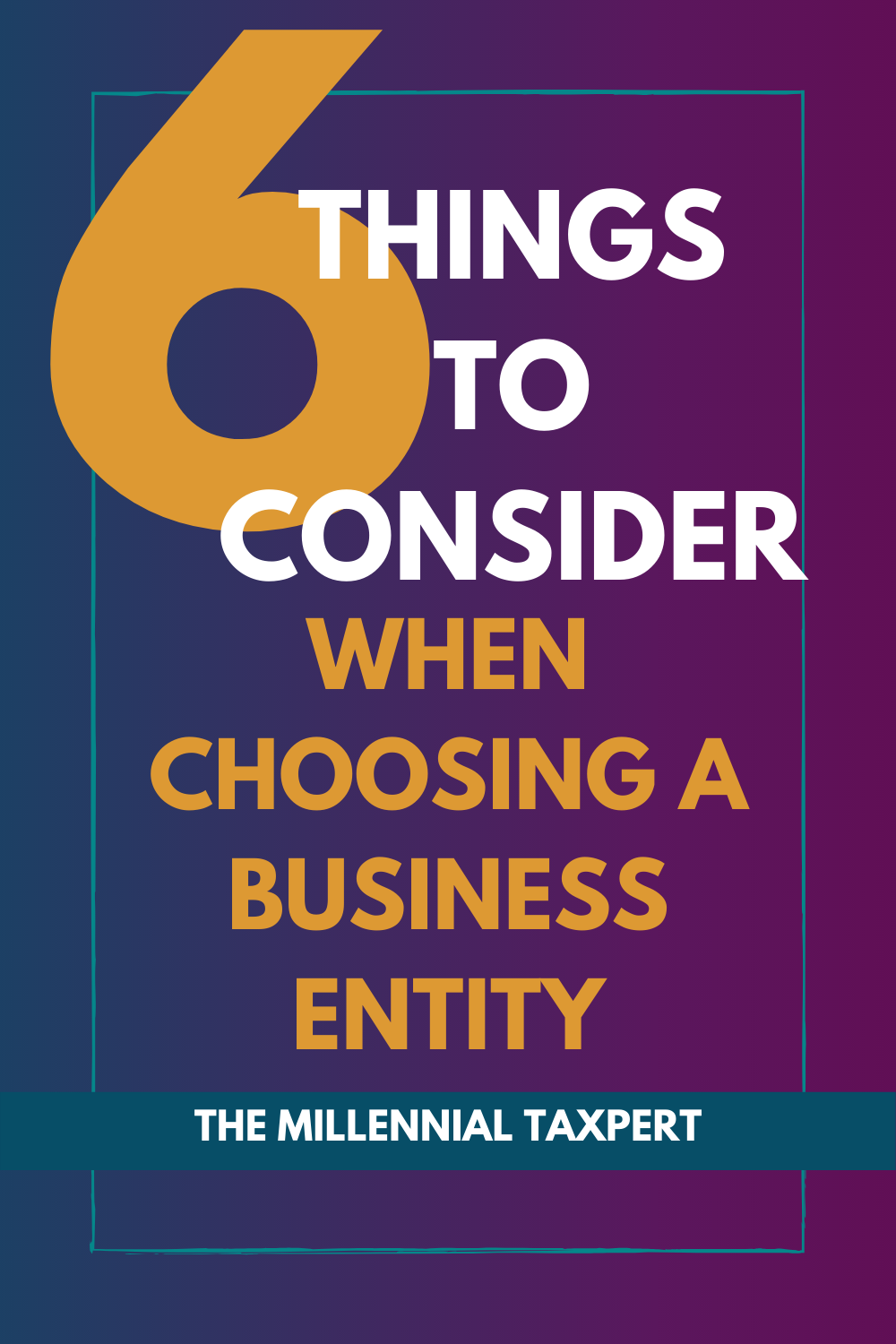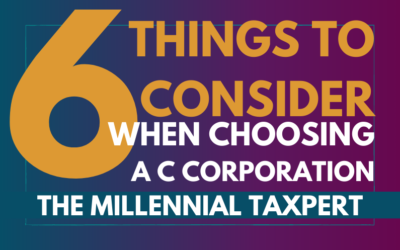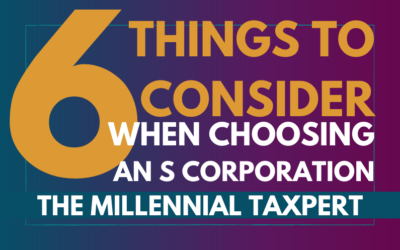Episode 32 | 23 Mins
How to Choose a Business Entity | 6 Things to Consider
Quick question. Have you slid into the inbox of a tax pro and asked them to tell you whether you should create an LLC or an S-Corp for you new business? If so, you might have gotten answers like “it’s hard to say”, “it depends”, or “book a consultation”. It’s probably the number one “quick question” I get. So today I’m sharing with you six things to consider when choosing a business entity. Writing down your thoughts to these 6 categories will make the conversation with a tax professional and lawyer much more focused and can help you easily weed out the structures that won’t work for you. Make sure you check out the show notes to download your FREE workbook that you can use as you follow along with this episode.
Listen
Watch
Read
(this transcript has been edited to improve readability)
As tax professionals, we get the question all the time, “what business entity should I choose?” Usually, it is in our inbox on social media. People slide in our inbox, you probably have done it too, and say, “Hey, I’m starting a business. What kind of business should I set up? Should I be an LLC? Should I be an S corp?” That’s not nearly enough information for us to make that decision.
There are projections that need to be run. There are so many different factors to take into account. We just can’t make that decision based on so little information.
So instead of jumping into a tax professional inbox, like, “Hey, I have a quick question.” You should jump into the inbox and say, “Hey, I’m just starting a business, do you have any time in your calendar for a consultation?” because, honestly, that’s really what’s necessary.
So without further ado, let’s go ahead and jump into the six things to consider when you are choosing your business entity. Actually, a little bit of further ado. Before we get into the actual six considerations, I do want to say a couple of things.
FREE DOWNLOAD
First of all, if you look in the description to this video (or if you’re listening to this on the podcast, if you go to the show notes, and go all the way down to the resources section of the show notes), you will see a link to download a free business entity selection workbook that you can use to follow along with this episode and jot your ideas down as we’re going through it. Then, of course, go back afterward and formulate your thoughts a little better. They can just be brainstorming. You don’t have to write in complete sentences. It’s your workbook. You can pause the episode or video as you need to in order to get your thoughts out.
As I explain each consideration, you can write whatever comes to your mind. Follow along with this episode using the workbook, so that when you do have your consultation with the tax professional and the lawyer, you can use it to have a guided conversation with them instead of just kind of throwing stuff to the wall.
So check the description box of this video, check the show notes for the episode for those of you listening on the podcast, download that ebook. It’s a PDF document you can print out, and you can write on it. And you can make as many copies of the pages as you want for additional space to write. It’s up to you, it’s yours.
(Just you know, don’t share it with people, have them download it themselves.)
That’s my free gift to you so that you can follow along and formulate your thoughts so you can actually come with a plan when you’re actually sitting down and talking to a professional about what kind of business you want to have.
YOU MAY NOT GET EVERYTHING YOU WANT
The second thing is that, to me, choosing a business entity is like buying a house. (I love searching for houses, even though I’m not actually about to buy one right now. So I might compare everything to buying a house, but hear me out, right?)
When you’re buying a house or you’re looking at houses, you have a list of deal-breakers – things that you have to have or that it’s a no go – and you have a list of things that you want to have. Sometimes the list of things that you want to have, you may not get a house that’s going to have all those things on the list. Additionally, you may end up realizing that your deal breakers aren’t really deal-breakers. It’s the same thing when it comes to entity selection.
The entity that you choose is likely not going to hit all the things on the list that you’re writing down in your workbook, so you want to determine what’s most important to you, what’s really not that important to you, what things you’re willing to budge on, what things you’re not willing to budge on and choose the entity that fits it the best.
There are going to be some situations where it only hits a couple of the things that you want, but those things are super, super important to you, so the other things really don’t matter, and that’s the entity that is probably going to be the best for you. It really is a process of elimination and I hate to make it that simple and make it sound that simple. But it really is a process of elimination based on what you want from your business.
This is why it is impossible for us to tell you what kind of business entity you should have simply based on the fact that you are opening a business. It really should be tailored to your business. Don’t feel any type of way if you write all of these things down and you come back and realize that none of the business entities hit everything on your list. They’re probably not going to. You want to choose what is most important to you and go with the business entity that hits most of your super important items on the list.
As I’m going through these considerations, I’m going to be giving some examples for most of them. However, I’m not going to go into too much detail about how each of these entities stacks up when it comes to the considerations. I really want you to use the workbook and go through it.
You don’t even necessarily have to use the workbook. (I really want you to use the workbook.)
But even if you just have another slice of paper… a slice of paper?
A piece of paper… what is this pizza?
Even if you just have a piece of paper that you’re jotting your notes down on, I don’t want you to be biassed towards a certain business entity over the other, I really want you to jot down your unfiltered thoughts.
Over the next several episodes, I’ll be going more in-depth for each of these six considerations for each business type. So the next four episodes will be these six considerations for a sole proprietorship and how they apply. These six considerations and how they apply to a partnership, and so forth, and so on. Then you can come back and watch those episodes or listen to those episodes and see how it stacks up against your list.
Cool? Cool.
Now, let’s go ahead and get into the six considerations. Are y’all excited? I’m super excited. I’m not going to delay y’all anymore.
Oh, I am going to delay y’all one more second. I do want to point out that out of these six considerations, five of them have absolutely nothing to do with taxes.
Out of the six considerations, five of them have nothing to do with taxes.
That should let you know right there that you should not be making decisions on the entity that you should choose for your business simply based on tax benefits or perceived tax benefits. If you choose a business entity or if you just disregard a whole business entity just because of the tax consequences of it, you could be missing out on benefits in the other five categories.
That’s something I do want to point out before we get into the six. Five of the six considerations have absolutely nothing to do with tax. They are a mix of legal and what you want out of your own business, so personal and legal considerations.
All right. All right. Cool. All right.
(For those of y’all that are listening on the podcast, and not watching the video, I just did finger guns. I wanted you all to know that so that you don’t miss out on that experience.)
Alright, so let’s get into it.
CONTINUITY OF EXISTENCE
The first consideration is the continuity of existence. Continuity of existence basically means what do you want to happen to the business if God forbid something happens to you and you can no longer run the business because of serious illness or death, or you decide that you’re just done with it, you don’t want to do the business anymore, you’re retiring, whatever? Do you want the business to continue? Or do you not care and don’t mind if the business just goes away? So there are a couple of business entities, you probably already know what they are, that have perpetual existence.
Walmart Inc. – if all The Waltons decided they wanted to walk out and didn’t want anything to do with Walmart anymore, Walmart’s still going to exist.
However, if you have a sole proprietorship, for example, the business ends with you. It begins and ends with you. You cannot transfer ownership, which is something we’re going to talk about later, so I kind of jumped the gun on that one. Once you’re done with the business, the business no longer exists. That’s it.
So, what do you want to happen with the business after you’re done in the business? That’s the first thing: continuity of existence.
So go ahead and start jotting some notes down. Pause this episode, go ahead and make some notes, and then come back for the second one.
LIMITED LIABILITY
The second one is limited liability. Limited liability is basically asset protection. Do you want limited liability with your business or does it really not matter to you? Now, if you don’t automatically get limited liability because of the business entity that you have, then you might be able to purchase a product (read: insurance) that will give you similar or the same protections in your business as limited liability. Insurance may not necessarily limit your liability as much as having regular limited liability, but all that to say, it’s not always a take it or leave it type of situation. You could end up with a business entity that doesn’t offer those protections and still get similar protections.
The second one is limited liability.
TRANSFERABILITY OF OWNERSHIP
The third one is transferability of ownership, which basically means do you want to be able to transfer your ownership interest, or do you want your business partners to be able to transfer their ownership interest?
If so, do you want it to be easy? Or do you want to have some restrictions?
This really is important for succession planning. If you have a business and you’re getting to the point where you want to retire, you are ready to name a successor or exit from your business, how easy do you want it to be to transfer the ownership of that business to somebody else? Whether it be your kid, whether it be another business partner, whether it be a stranger off the street that wants to purchase it, how simply, do you want that process to go?
On the flip side, do you want to restrict the ownership interest and the transfer of ownership interest, so that neither you nor your business partners can transfer that ownership to somebody who nobody wants to do business with?
If you’re in business with your kids, and you really don’t like your daughter’s husband, or your son’s wife is trifling (or your son’s husband or your daughter’s wife, you know, no judgment), and you really don’t want them to be able to get ownership interest of the business or your business is super, super successful and making a lot of money and you just want to make sure that people aren’t marrying into the family because of the money so they don’t actually have control over anything, do you want to be able to limit the ability for those people to get ownership interest in your company?
The transferability of ownership interest is the third one.
CENTRALIZED MANAGEMENT
The fourth one is centralized management. This one is super simple. Who do you want to run the company? Do you want yourself to run the company? Or do you want to have a board? Do you want to have a management team like a separate CEO? A separate senior leadership team or whatever? Do you want somebody else running the company or do you want to be the one running the company? That one’s super simple.
SIDE NOTE:
These things can change. What you’re writing down is not set in stone. This is a living document. This is probably something that you’ll want to hold on to and revisit when you’re revisiting your business entity selection, and you’re going to make changes based on how your business is changing. Right now you might say “I want to be the one running the company”, and in two years, you might say “I need to bring on a team”. This is a living breathing document. It’s going to change it’s not set in stone, it’s okay if you change your mind later.
CAPITAL
Number five is capital. How are you gonna get the money to run this thing boo?
That’s what capital is. Do you want to be able to take on investors and give them an ownership interest in your business? Are you okay with personally guaranteeing and being personally liable for the debt. Those are things you want to think about.
This is one of those examples that if you’re like “a deal-breaker is that I want to be able to bring on investors and give them a small percentage of ownership in the company as an incentive for them to invest”, you’re out when it comes to a sole proprietorship because, by definition, a sole proprietor only has one owner. That’s why this is a process of elimination.
It’s important for you to write these down and then come back and revisit the different business entities and how they apply these six considerations because you’re going to be able to knock out a couple of these with your deal-breakers.
TAX IMPLICATIONS
And then number six, all-mighty number six, is tax implications. This is where we come in. All the other ones are personal decisions & legal decisions, especially when it comes to limited liability. The tax implications consideration is where tax people come in. This is where we start to run our projections and see from a tax perspective, which one is the best.
Now, it’s important to say, just because an entity is the best from a tax perspective, doesn’t mean it’s the best overall. It’s very possible that you find that a business that works best for you is not the one that’s going to save you the most money in tax.
That’s why it’s important not to choose a business entity simply because of the tax implications.
It’s important to talk to a lawyer and see what the legal implications are for each of these. It’s important to consult with yourself and see what you really want from all these other considerations.
When it comes to tax implications we’re talking about are you okay with being subject to double taxation?
I heard you.
I heard you.
I heard you.
I heard you.
The answer’s no, I heard you, I got it, I got it.
But in some cases, it’s absolutely more beneficial for you to be subject to double taxation. This is for people with higher incomes. I know I’m talking to my small business owners out there, but by SBA definitions, a small business can have like 20 something million dollars in income. So if you’re a seven-figure business, you could still be a small business owner. It might be beneficial for you to have a C Corp and be subject to double taxation based on how you’re running your business. That’s just something I wanted to throw out there. Don’t kill me because I asked that question.
Do you want to be subject to double taxation, what’s the tax rate for all these different businesses? Is there a self-employment tax that you’re going to be subject to based on the different businesses that you have? Do you qualify for the “qualified business income deduction”? Can you deduct owner fringe benefits? If you give yourself fringe benefits, can you deduct those? What’s the deductibility or of your net operating losses? Are you limited on how you can utilize those net operating losses? Or are you not limited?
What’s the risk of audit? That’s a big one. And I don’t mean that to say like, “oh, Kesha got an LLC. We’re gonna audit her because she an LLC.” It’s more so that it just so happens that some business entities get audited less than other business entities and I have my theories on why that is.
I’ll share them with you: it’s because small sole proprietors and LLCs operating as sole proprietors and small partnerships and stuff probably don’t do good with their bookkeeping.
And when I say probably, I mean they don’t.
So their tax returns are usually wrong. So that’s my theory.
The IRS does happen to audit or tends to audit sole proprietorships a little bit more than they audit corporations. So there is value in that, what’s the risk of audit?
When you sell your business, do you want to be able to exempt the gain on the income from tax?
Yes, I hear you. The answer’s yes, everybody wants to do that.
But in order to do that, you have to be subject to double taxation because you can only do that with the C Corp. There are so many different things that you have to take into account and sometimes you will say no here and yes here, but those are the same entity.
So, hopefully, all of that made sense. Make sure you download the workbook so that you can go back and watch this video, or listen to this podcast episode and jot down your thoughts. Keep working on it, revisit it a couple of times, take it when you have a consultation with a lawyer and a tax professional so that you can tell them your thoughts and it’ll make their job a little bit easier when it comes to trying to narrow down what’s best for you because from your answers they’ll be able to take some things off the table.
Hopefully, that makes sense. Hopefully, that helped. Make sure you come back next week when we are going to be discussing how these six considerations apply to sole proprietorships. You can use your workbook and you will be able to take the information that you wrote down, follow along with that video, and see if a sole proprietorship applies. And then the next week we’re going to do partnerships, and an S corp and then C Corp. That is the content calendar for September for anybody that was wondering.
Thank you guys so much for listening. I can’t wait to talk to you next week about sole proprietorships and these six considerations. Make sure you meet me back here, and I will talk to you then.


Kesha JonTae'
Host
Follow Me
Pin This Episode

Related Episodes
Choosing a C Corporation | 6 Things to Consider
Episode 36 | 24 Mins Choosing a C Corporation | 6 Things to Consider How do you know if a C corporation is right for your business? A C Corporation is the default corporation type. Many people consider C Corporations to be for big companies, but they can be...
Choosing an S Corporation | 6 Things to Consider
Episode 35 | 17 Mins Choosing an S Corporation | 6 Things to Consider How do you know if an S corporation is right for your business? ListenWatchRead (this transcript has been edited to improve readability)As tax professionals, we get the question all the time, "what...



Trackbacks/Pingbacks